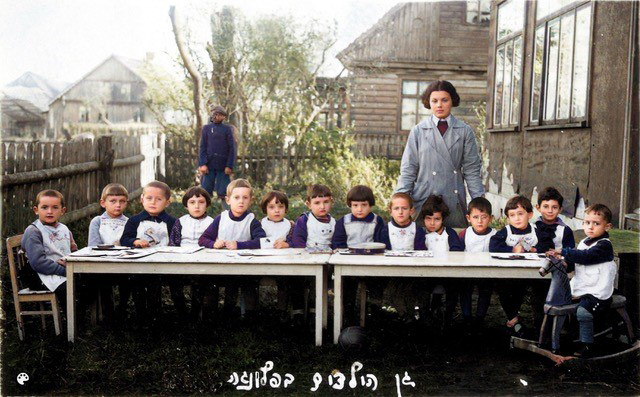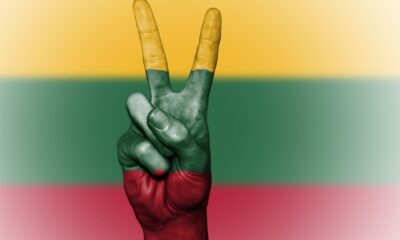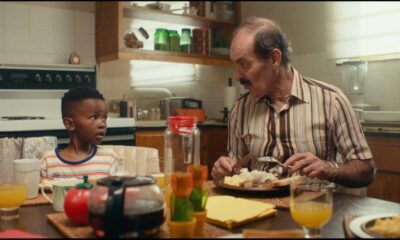
Lifestyle/Community

New film gives voice to Lithuanian Holocaust victims
Published
2 years agoon
When thinking about the Holocaust in Lithuania, some of us can only think about the horror from a distance or in small doses. But filmmaker Michael Kretzmer has made it his duty to look up close in a new documentary that exposes the depravity of the killing, and questions Lithuania’s Holocaust denial.
The documentary, to be released in Australia in November, looks at the “murder of children in front of parents; the smashing of babies’ skulls against trees; girls being loaded onto trucks for deadly rape parties by Lithuanian gangs; the imprisonment of thousands of Jews in their own synagogues and their murder either by fire or starvation and thirst amidst human filth and the stench of their loved ones’ rotting bodies; the beheadings; the immolations; and the thousands of lethal humiliations”.
This is what Kretzmer found over the past three years, during which his life was “entirely absorbed” in the making of the documentary that “attempts to tell the truth about the Lithuanian Holocaust”.
Kretzmer was born in Bulawayo, Zimbabwe, in 1954 to Litvak, South African parents. “My dad was from Heilbron – I still take special pride in the ‘Vrystaat Yidden’ – and my mom from Krugersdorp. My grandparents were Yiddish-speaking shopkeepers. My parents immigrated for political reasons, and although we always had the proverbial bag packed, they stayed.
“This community sparkled with Litvak energy and created a generation of young Jews who have left their mark across the globe,” he says. “I was active in Habonim South Africa and a graduate of Wits University in law. I left in 1975 and became a journalist in the United Kingdom, writing for the Sunday Times and making documentary films. I retired about 12 years ago and built a little farm.”
Three of his grandparents came from Lithuania, the fourth from Riga. “My father’s family lived in Birzai, in northern Lithuania, for centuries. Very few of my family managed to immigrate to South Africa. The rest – hundreds of them – were murdered.”
His passion for the past began when, in 2019, “I went to Lithuania for the first time to say kaddish at the unveiling of a monument naming the victims of the Birzai slaughter – and special gratitude to Abel and Glenda Levitt for making this possible. So thorough was the killing, that our experts were able to name only 550 of the 2 400 Jews who were mercilessly murdered on that day. Of that number, scores were Kretzmers. Since then, I have felt it my duty to tell the story of what happened then, and what’s happening in Lithuania today.”
Initially, he thought Lithuania “was doing everything it could to come to terms with the Holocaust. At one stage, a Lithuanian production company offered me a commission to make a well-funded film about it. I refused, as I was becoming aware of the excellent work of Efraim Zuroff, Ruta Vanagaite, defendinghistory.com, and especially Grant Gochin and Silvia Foti, who are the heroic protagonists of my film. These people opened my eyes to the scandal of Lithuanian Holocaust denial.
“This realisation affected me deeply, and I decided I had to do what I could to fight back,” he says. “From that moment, I have spent every day fundraising, writing, researching, directing, producing, and completing my documentary, titled J’Accuse!”
He admits it has been “a terrible task that has exacted an immense personal price. Many times, I bitterly regretted taking it on. But the injustice of what happened to our people, and even more importantly, what’s happening today, cannot be ignored.”
His film will premiere in November at the prestigious Jewish International Film Festival in Australia. It tells of “the destruction of a dazzling 600-year-old civilisation – 220 000 Jews, the highest murder rate in all of Holocaust Europe” and “gives voice to the murdered – it’s their cry for justice from the killing pits of Lithuania”.
Elaborating on the sacrifices the project demanded, Kretzmer says “financial and time sacrifices were endurable because of my supportive, loving wife of more than 40 years, Joanna. But the most difficult sacrifice was the emotional exposure. Like many Litvaks, my family avoided the specifics of the Lithuanian Holocaust. Of course, the Holocaust was the backdrop to our lives, but we avoided thinking too much about the horrendous fate of our ‘missing’ families.
“This was a survival mechanism and an act of courage on the part of our parents and grandparents, who were thinking of us, their children, ‘How can children move forward with such terrible knowledge?’
“But once I’d committed to making the film I was obliged to understand and internalise everything that happened – all the depraved torture, rape, humiliation, and mass murder. One reason that Lithuania gets away with what it does is because we’re all – Jews and non-Jews – fearful of this exposure. Three generations on, we have to face it. In light of Lithuania’s cynical hero-worship of mass murderers, we Jews have no option. Nor does Lithuania, actually.”
He was motivated to keep going to “bear witness and powerfully affirm Jewish honour”.
“The Lithuanian Holocaust was characterised by its determination to utterly dehumanise us prior to our murder. I want my film to stand as a demand for the restoration of Jewish honour in its profoundest sense, and to tell the Lithuanian government, Europe, and the world that there are Jews who won’t allow countries to get away with the hero-worship of our killers.
“The second reason was an obligation to honour Silvia Foti, the amazing Lithuanian woman who has written the truth about mass murderer Jonas Noreika, who was her grandfather. It’s not often that we Jews get a person who stands up for truth and risks everything. If we don’t support this good woman, then how can we ever expect other people of conscience to stand up for us? The final reason was to honour a promise I made to G-d and my own murdered family.”
He says what makes his film unique is its “voice”. “This voice belongs to the children of the Plunge kindergarten, featured on the film’s heartbreakingly vivid poster. They are the ‘scriptwriters’. My film asks the questions they would ask. It makes the demands they would make. And it tells the unvarnished truth. The voices of these children are those that matter most.”
He says South African Jews will find the documentary “painful, empowering, and very interesting. It will help my fellow Southern African Jews understand our glorious origin and contribution to modernity. I also hope it will reveal something of the immense impact Lithuania had on Jewish institutions and culture in South Africa. But most importantly, I hope the film will enable South African Jews to support our murdered families, if only by articulating the demand that Lithuania shouldn’t get away with this unnecessary and cruel insult.”
After its premiere in Australia, Kretzmer will be working hard to distribute the film across the world and in South Africa especially. “If anyone wants to help me, please get in touch!” he says. “The South African audience is, for me, the most important.”
To the South African Jewish community, he says, “South African Jews of a Litvak background should be proud of their Lithuanian heritage. Whatever rights we may have to citizenship are legal and inherited. We should remember our history, and act with strength – we have nothing to be ashamed of. Quite the opposite, in fact.”
“It’s important to recognise that the Lithuanian people are the victims of what’s happening in Lithuania today. As Foti puts it, they are ‘held hostage’ by their government’s support for mass murderers like Noreika, and made complicit in his crimes. Can you think of a more terrible inheritance? Lithuania is suffering, and Foti offers a path to redemption and true reconciliation with the Jewish people. Our fight isn’t against the innocent Lithuanian people, and we should make this clear.”
On the other hand, “the civilised world mustn’t allow Lithuania to get away with this outrage”, says Kretzmer. “The Lithuanian government’s practice of manufacturing lies in order to hero worship the mass murderers of innocent Jews is unforgiveable. If this is permitted, then the Holocaust has become meaningless. It’s an existentially important issue for Europe and the world. It’s time to fight back.”











ROSALIE DONADIO
Oct 27, 2022 at 4:03 pm
Hopefully there will be distribution in the U.S. I, too, was informed about the descendants of Birzai gathering, but due to serious mobility issues, I sent a donation in my grandparents name. My grandmother and several of her (large) family emigrated to the U.S. to Chelsea, Mass (also known as Little Lithuania) and the Yiddish we speak is of a particular dialect. My family name is Chait. (One great uncle, Rubin Chait, returned to Birzai; he and his wife and children who had not emigrated were murdered in August of 1941). I thank Mr. Kretzmer for his film and not “letting this go”. It wasn’t until my adulthood that I understood why they only referred to their “home” as the old country without a specific indication … how could one yearn for a time of fear, persecution, injustice and maltreatment. Litvaks came to America with nothing (turn of the last century) and with the opportunities, succeeded in many areas of the culture, the law and the arts … and medicine, science, ad infinitum. And Lithuania languished without their Jews (and yet we are now facing a similar hostile environment: one can only hope but there remains one difference – Israel.